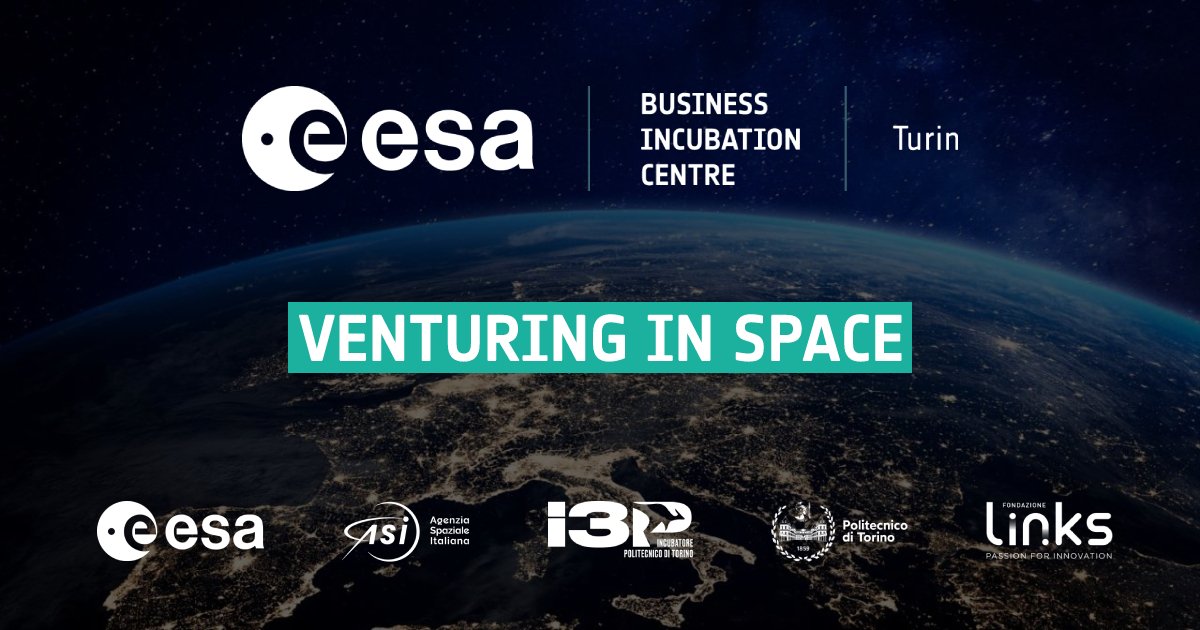Spacesuits to protect astronauts, stratospheric platforms for Earth observation, drones for lunar exploration, IoT and data analytics solutions to improve sustainability and efficiency in agriculture. These are just some of the innovative projects of the seven companies that officially entered the ESA BIC Turin incubation program at the start of 2023, after the completion of the second selection in 2022. ESA BIC Turin thus gathered a community of 15 incubated start-ups in just over a year of activity, following the inauguration in November 2021 and the entry of the first eight young companies in May 2022.
The latest start-ups entering the program are named DBSpace, Evolunar, Nabu, Orbital Outpost Italy, REA, SpaceMotionery, Stratobotic. Like their predecessors, the new companies will not only receive a zero-equity financial contribution of €50,000, for both the development of the product at the centre of their business plan and the management of intellectual property, but also business and legal consultancy services, technological support, assistance in capital raising, and access to a broad network of partners, including corporate entities, investment funds, and research institutions.
“The number and quality of entrepreneurial projects supported by ESA BIC Turin in its first year of activity confirm the liveliness and attractiveness of our region for the space sector. Politecnico di Torino is committed to supporting the technological development of the incubated companies in order to increase their opportunities for growth and market success. The research and projects on the PNRR funds managed by our university in the aerospace sector will be able to further fuel the activities of the ESA BIC Turin incubation centre in the coming years,” said Guido Saracco, Rector of Politecnico di Torino.
The selection of start-ups will continue also this year: the next deadline for submitting applications is March 6th, 2023. The official website www.esabic-turin.it offers information and materials to apply a space-related business project for the incubation program, as well as useful tools, news about current opportunities and interesting industry events for all those who look at space and dream of launching a new venture, today or tomorrow.
The projects of the selected start-ups
DBSpace proposes an advanced electric-pump for liquid and hybrid propellant engines. This simplified sub-system has no turbine and it is based on an electrical power drive assembly. The solution is characterized by lower costs, improved performances and mission flexibility.
Evolunar is a spin-off of Politecnico di Torino that aims to develop drones for lunar exploration, in particular for difficult-to-access sites such as lava tubes, craters and permanently shadowed regions. An example of this is the LuNaDrone, a small 15 kg spacecraft for autonomous flight above the lunar surface: its design, geared towards flexibility and modularity, makes it compatible with the smallest lunar landers, as well as with a wide range of payload categories, and makes it possible to maintain a low cost by avoiding complete redesigns as mission requirements change.
Nabu develops IoT (Internet of Things) and satellite data analysis solutions to improve sustainability and efficiency in water management, particularly irrigation systems in agriculture, which are responsible for 70% of the world's water consumption.
Orbital Outpost Italy aims to become a major provider of critical resources in space such as pressurized hydrogen and oxygen, water, heat and energy. Towards this end, the start-up is initially developing highly efficient systems for extracting in situ resources from the Moon, primarily water and sunshine.
REA was founded with the aim of offering astronauts a solution for long space travel without physiological and biochemical problems. The company's main product is an intravehicular space suit (IVA) designed to interact with postural muscles and made of a new patented elastic fabric, suitable for use in all microgravity missions and, in the future, for lunar exploration.
SpaceMotionery is a spin-off of Politecnico di Torino that proposes a family of different test equipment to enable the testing of micro- and nano-satellites, and also to be used for technical training in the space sector. The start-up’s first product is a system able to simulate sunlight effects at a low cost, while the second solution consists in an attitude test bench, to be used for the verification and testing in dynamic and black-box mode of the Attitude Determination and Control System (ADCS) of a CubeSat.
Stratobotic proposes a small and reusable High-Altitude Pseudo-Satellite (HAPS) working in swarm at 20 km of altitude on the Earth. This affordable HAPS is easy and fast to deploy and upgrade, offering a dynamic and customizable solution for telecommunications and planet observation, without any need for complex infrastructures.
A network for space innovation
ESA BIC Turin is an incubation program aimed at fostering the development of an attractive local ecosystem for the growing space entrepreneurship and all the industrial, financial, scientific and institutional players that revolve around it. Its main objectives include the development of start-ups with a high degree of technological innovation and the collaborative involvement of all the stakeholders who are active in the space economy sector.
Launched at the end of 2021, the ESA BIC Turin program is managed by I3P, the Innovative Companies Incubator of Politecnico di Torino, with the technological support of Politecnico di Torino and LINKS Foundation, in coordination with the European Space Agency (ESA) and the Italian Space Agency (ASI), which provide technical and financial support. The project is also supported by Regione Piemonte, which provides part of the contributions to the start-ups, the Turin Chamber of Commerce and Fondazione Compagnia di San Paolo, which also provides the incubated companies with innovative investment tools to support their technological development and growth phase.

